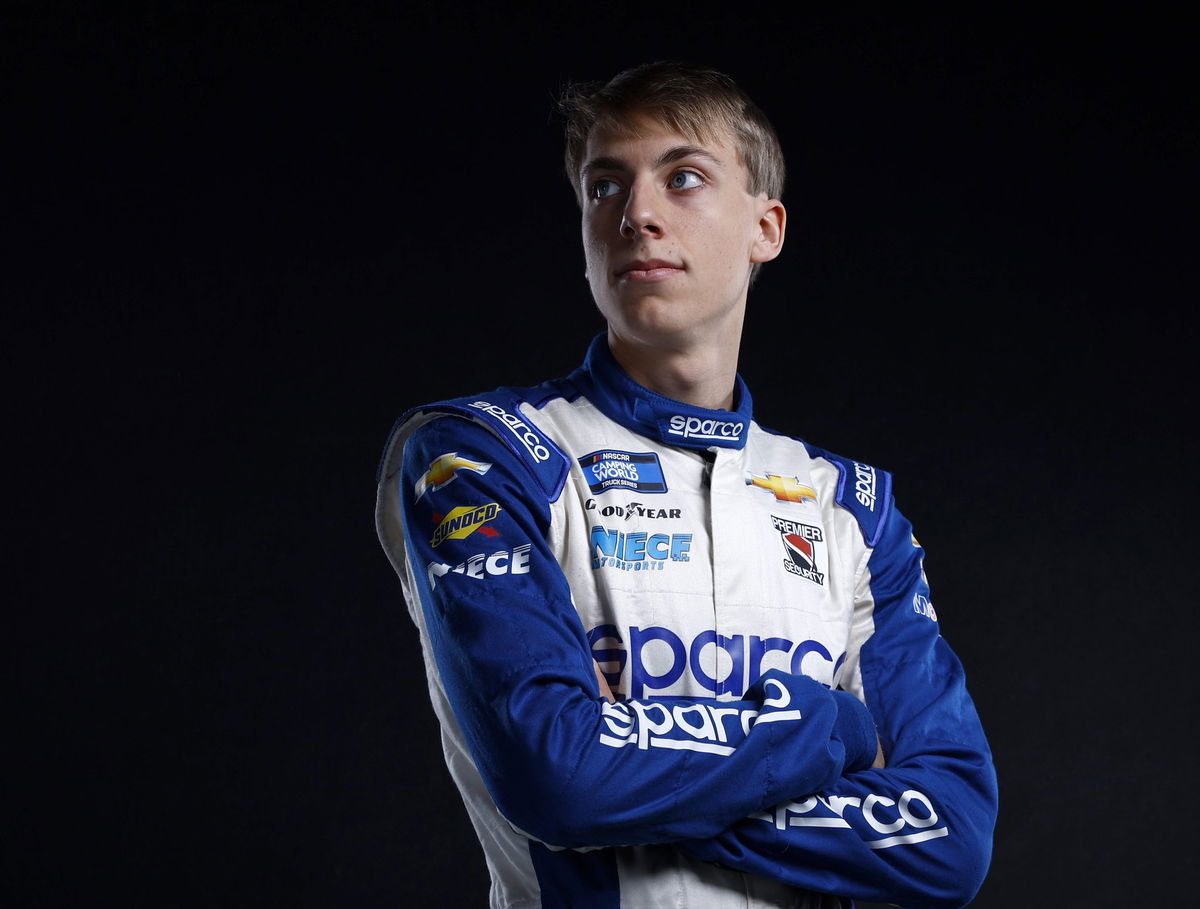
Imago
Carson Hocevar

Imago
Carson Hocevar
If there’s one thing NASCAR fans love more than racing, it’s debating how “terribly” the sport is broadcast. Commentary, camera angles, commercials—you name it, fans have an opinion. This time, the discussion hit a new gear when Brett Griffin, one of the sport’s most vocal spotters, took to Twitter with some bold thoughts about NASCAR’s coverage. But he didn’t stop at critique; he compared it to college football and left no room for subtlety.
Watch What’s Trending Now!
It wasn’t long before 21-year-old Cup series star Carson Hocevar weighed in, defending the current broadcasters while pointing a finger at something else entirely. His take added fuel to a debate that’s been bubbling for years: is the problem with the people calling the races, or is it something deeper?
Brett Griffin vs. Carson Hocevar
“The best thing about college football is the diversity of broadcasters,” Griffin tweeted. “NASCAR is too much from the same folks week after week. We gotta figure out how to make some of the energy get better around here.”
Griffin’s tweet struck a chord, with many fans applauding him for saying what they’ve been thinking. To them, NASCAR broadcasts have grown stale, lacking the energy and creativity that keep viewers glued to their screens. But Carson Hocevar wasn’t having it.
The best thing about college football is the diversity of broadcasters. NASCAR is too much from the same folks week after week.
We gotta figure out how to make some of the energy get better around here.
— Brett Griffin (@SpotterBrett) November 30, 2024
“It seemed fine with the same people during the Speed Channel years,” Hocevar shot back on Twitter. “There was 2-3 hours of practice to build storylines and have more to talk about.”
His point? Back when fans could tune in to hours of practice and qualifying sessions, broadcasters had more time to dig into the details, spotlight underdog stories, and set the stage for race day. Now, with those sessions cut back or eliminated, it’s harder to create the same depth of coverage.
it seemed fine wirh the same people during the speed channels years when there was 2-3 hours of practice to build story lines and have more to talk about
— Carson Hocevar (@CarsonHocevar) November 30, 2024
Fans quickly took sides. Some rallied behind Griffin, arguing that the energy of race broadcasts just isn’t there anymore. While others argued that pure energy doesn’t equate to valuable insight and coverage, sure it’s a part of broadcasting but on its own, it proves quite shallow. “We need broadcasters who can bring storylines and personality to parades while not screaming every other corner,” one fan tweeted. “Screaming doesn’t equal exciting.”
Others backed Carson Hocevar, pointing out how much easier it was to stay invested during the Speed Channel years. “If college football only had one game a week, all we’d hear is Chris Fowler & Kirk Herbstreit,” one fan argued. “Consistency matters, and rotating announcers wouldn’t help NASCAR at all.”
The debate also resurfaced an age-old grievance: commercials. Fans have long griped about the sheer number of ads during races, especially on FOX. Many feel like they’re watching more commercials than racing, making it hard to get into the flow of an event. As one fan put it, “Too many commercials. It felt like they’d come back for 10 laps and then cut away again. I get that ads bring in money, but this was excessive.”
NBC vs. FOX: A broadcast battle and what’s next for 2025
Of course, the conversation wouldn’t be complete without revisiting the perennial rivalry between NBC and FOX. In 2024, NBC seems to be the fan-favorite, praised for its polished production and strong commentary team. Even after losing Dale Earnhardt Jr. from the booth at the end of 2023—a move some thought would be catastrophic—NBC managed to keep fans happy. Leigh Diffey’s smooth play-by-play and the chemistry of Steve Letarte and Jeff Burton helped the network maintain its edge.
FOX, however, hasn’t fared as well in the court of public opinion. While veteran Mike Joy still commands respect, fans have mixed feelings about the booth dynamic. Clint Bowyer’s high-energy antics leave some entertained and others exhausted, while Kevin Harvick’s technical insights have earned quiet appreciation. But for many, the broadcast is bogged down by commercial overload and a perceived lack of attention to the full field of racers.
“When FOX isn’t at commercial, they rock green-flag pit stops,” one fan admitted, praising their use of track maps and strategy breakdowns. But moments like that seem too few and far between. For many fans, NBC just feels more cohesive and professional, leaving FOX with a lot to prove.
Looking ahead to 2025, NASCAR’s broadcast landscape is set for a shake-up. The sport’s new media deal splits coverage between FOX, NBC, Amazon Prime, TNT, and The CW. Amazon will stream five mid-season races, TNT will handle five late-summer events, and The CW will air the entire Xfinity Series.
Fans are cautiously optimistic. Amazon’s entry into NASCAR has sparked hope for fresh, innovative coverage that could appeal to younger, digital-first viewers. Meanwhile, TNT’s involvement has fans reminiscing about its mid-2000s broadcasts, known for creative race intros and engaging commentary.
But there’s also concern about how splitting coverage across multiple platforms will affect continuity. NASCAR fans have grown used to the mid-season handoff between FOX and NBC, and adding more networks could make it harder to follow the season.
For now, though, Griffin’s critique and Carson Hocevar’s defense have reignited an important conversation. The way NASCAR races are presented matters deeply to its fans, and as the sport evolves, so too must the broadcasts.


